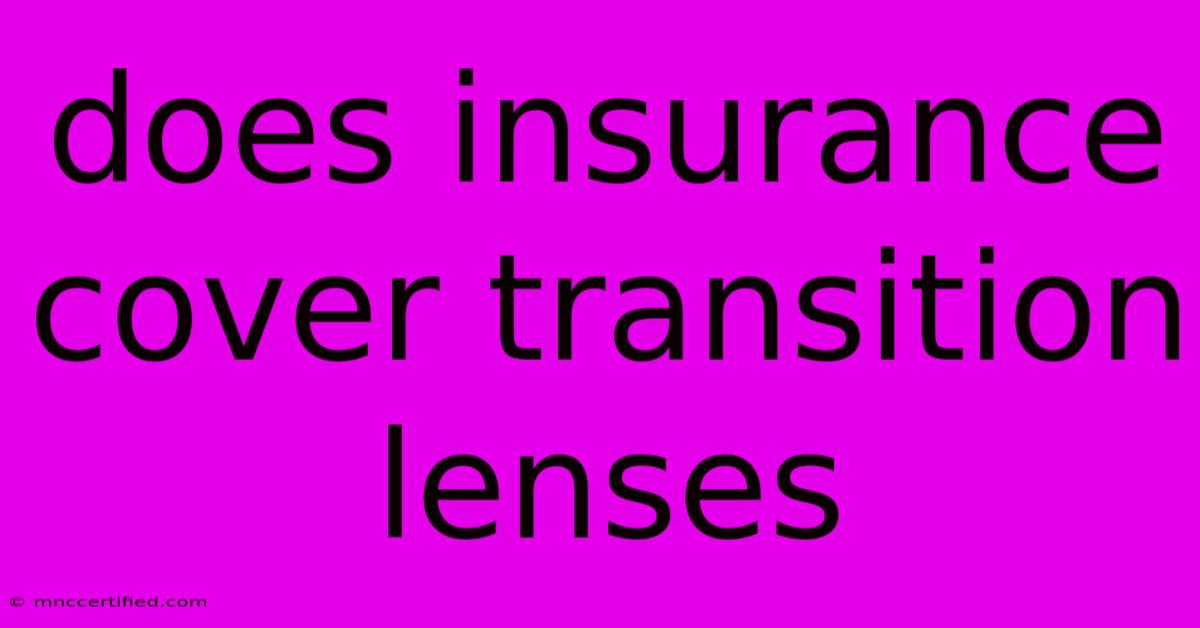Does Insurance Cover Transition Lenses

Table of Contents
Does Insurance Cover Transition Lenses? A Comprehensive Guide
Transition lenses are a popular choice for those who want the convenience of one pair of glasses for both indoor and outdoor use. But when it comes to insurance coverage, there's some confusion. Do insurance plans typically cover transition lenses? The short answer is: it depends.
This article will delve into the factors that determine insurance coverage for transition lenses, helping you understand what to expect when seeking reimbursement.
What are Transition Lenses?
Transition lenses, also known as photochromic lenses, are special lenses that darken in response to ultraviolet (UV) light. This means they act like regular glasses indoors, but automatically adjust to become sunglasses when exposed to sunlight.
Factors Affecting Coverage
Several factors play a role in whether your insurance plan covers transition lenses:
1. Your Insurance Plan:
- Basic Plans: Often cover only the basic frame and clear lenses, leaving transition lenses as an additional cost.
- Vision Plans: May offer more comprehensive coverage, including transition lenses, but with specific limitations like a maximum allowance or a co-pay.
- Employer-Sponsored Plans: The specific coverage for transition lenses can vary widely depending on the employer's chosen plan.
2. Your Individual Needs:
- Medical Necessity: Transition lenses are not typically considered medically necessary like prescription lenses. They are seen as a lifestyle choice, impacting coverage.
- Prescription Strength: Insurance plans might have minimum prescription requirements for covering transition lenses, so they may not be covered for mild prescriptions.
3. Lens Options:
- Types of Transition Lenses: While standard transition lenses might be covered, more advanced types like Transitions XTRActive or Transitions Vantage may require additional costs.
- Lens Materials: The type of lens material (polycarbonate, high-index) might also influence coverage. Some insurance plans may have specific requirements for the material used.
4. Your Location:
- State Regulations: Some states have regulations that require insurance companies to cover transition lenses, but this is not universal.
How to Check Coverage
1. Review Your Policy: The most reliable way to determine if your insurance plan covers transition lenses is to carefully read your policy documents.
2. Contact Your Insurance Provider: Call your insurance company directly to inquire about their specific coverage for transition lenses. Ask about any associated costs, co-pays, or limitations.
3. Consult Your Eye Doctor: Your eye doctor can help you navigate the process and understand your options, as they are familiar with your individual needs and insurance plan.
Tips for Saving Money
- Explore Alternative Options: Consider buying transition lenses separately or opting for a cheaper alternative like tinted lenses.
- Shop Around for Deals: Compare prices between different eye care providers and retailers to find the best deals.
- Ask About Discounts: Many insurance companies offer discounts for bundled services like eye exams, glasses, and contact lenses.
In Conclusion: While insurance coverage for transition lenses can be uncertain, understanding the factors that influence it can help you make informed decisions about your eye care. By thoroughly researching your plan and consulting with your eye doctor, you can determine the most cost-effective approach for your needs.

Thank you for visiting our website wich cover about Does Insurance Cover Transition Lenses. We hope the information provided has been useful to you. Feel free to contact us if you have any questions or need further assistance. See you next time and dont miss to bookmark.
Featured Posts
-
Sold Out Bronny James G League Debut
Nov 09, 2024
-
Insurance Companies In Russellville Ar
Nov 09, 2024
-
Balsam And Fir Trading Company Blanket
Nov 09, 2024
-
Bhad Bhabie Explains Weight Loss Cites Medication
Nov 09, 2024
-
Insurance License Classes In Tennessee
Nov 09, 2024